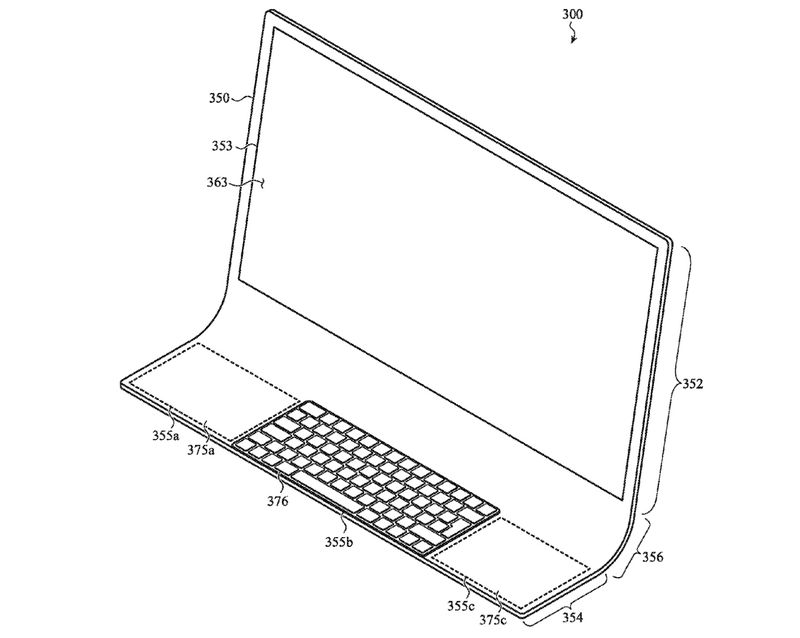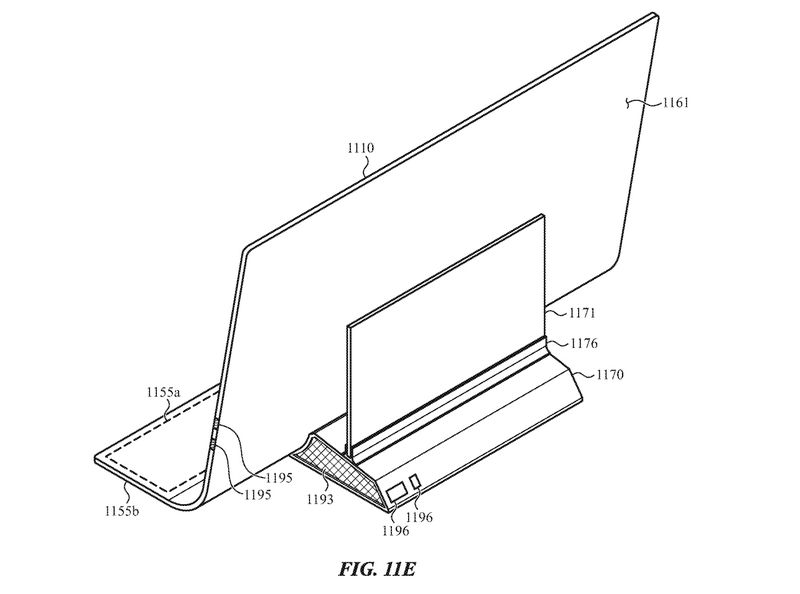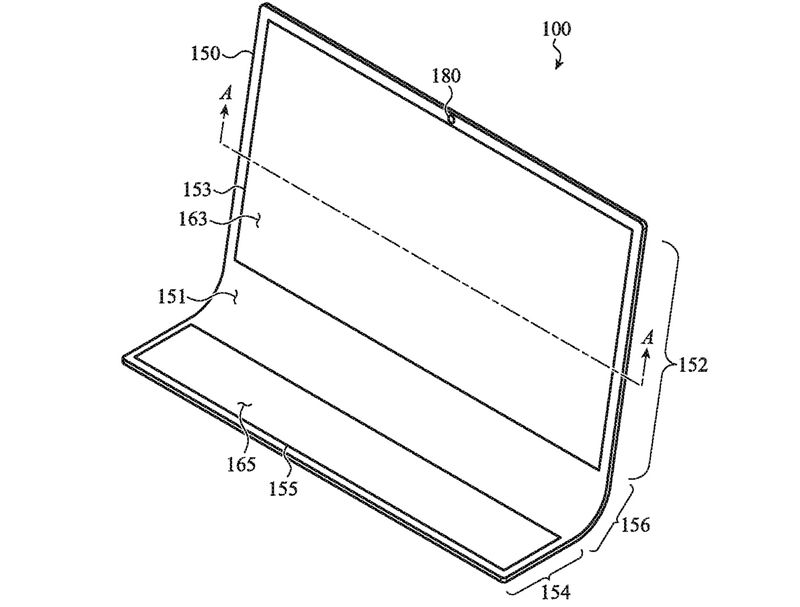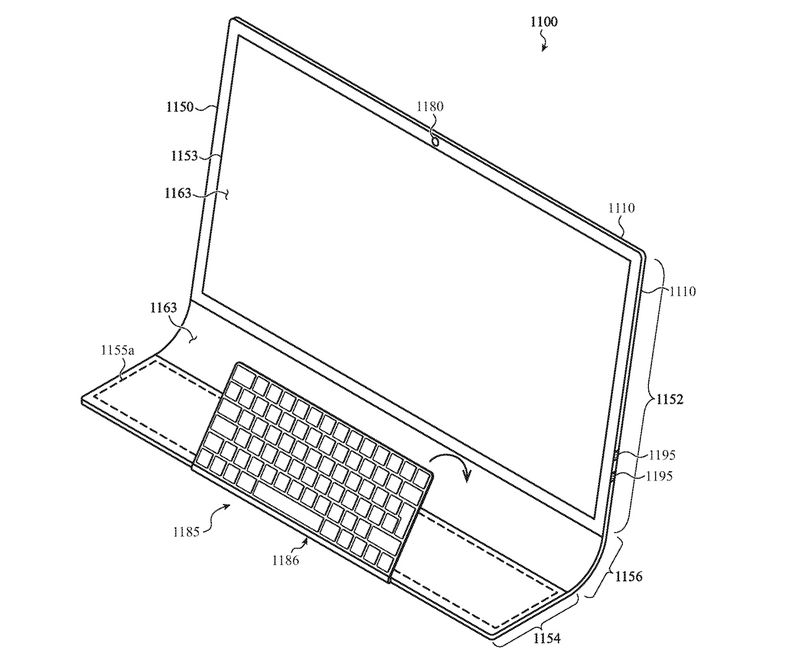Apple has all kinds of fanciful patents for imaginative devices that will likely never come to fruition, such as an iMac-like desktop computer made entirely glass, which was shared last week in a patent published by the United States Patent and Trademark Office.
Apple's patent describes an electronic device with an upper portion that serves as a display area, a lower portion that serves as an input area, and a transitional section that connects the two halves for a "continuous curved surface between the upper portion and the lower portion."

The lower section of the device rests on the desktop and is used for holding input devices, while the larger flat area serves as the display, with a stand at the back for propping it up and holding it in place. Given the thinness of the all-glass curved design of the Mac, the stand that holds it in place would be able to house necessary components and would also be able to be positioned differently to adjust the angle of the display.

The glass between the two sections of the device is described as flexible and able to change in angle between the display area and the input area. The input area is said to extend along a portion of the display area to form a "touchscreen-style display," and functionality such as wireless charging for other devices or data transfer capabilities could be included.

Apple separately describes multiple embodiments of the design, including one with a detachable, removable keyboard that fits over the lower portion of the glass design, which, when in place, allows the glass to detect the keystrokes.

The material for the design could have special features like scratch resistance, wireless charging support, or it could be able to allow touch and force to be detected through it. Apple also says biometric sensing capabilities could be included, detecting everything from fingerprints to heart rate, blood oxygenation levels, and temperature.
Because the patent describes both an "electronic device" and a "desktop computer," it suggests that this same design could be used for Macs or potentially an iOS device like an iPad. The patent goes into great detail about possible designs and functions, and further reading is available in the application on the US Patent and Trademark Office website.
Apple hasn't redesigned the iMac in some time, and although the patent appears to describe an iMac-like desktop computer, this probably isn't the implementation that we're going to see when Apple ultimately debuts a new iMac enclosure. Apple patents all manner of devices that never make it to production, but with curved glass and foldable devices becoming more popular, there is a possibility that we could see some of the functionality described in this patent at some point in the future.
Apple's patent describes an electronic device with an upper portion that serves as a display area, a lower portion that serves as an input area, and a transitional section that connects the two halves for a "continuous curved surface between the upper portion and the lower portion."

The lower section of the device rests on the desktop and is used for holding input devices, while the larger flat area serves as the display, with a stand at the back for propping it up and holding it in place. Given the thinness of the all-glass curved design of the Mac, the stand that holds it in place would be able to house necessary components and would also be able to be positioned differently to adjust the angle of the display.

The glass between the two sections of the device is described as flexible and able to change in angle between the display area and the input area. The input area is said to extend along a portion of the display area to form a "touchscreen-style display," and functionality such as wireless charging for other devices or data transfer capabilities could be included.

Apple separately describes multiple embodiments of the design, including one with a detachable, removable keyboard that fits over the lower portion of the glass design, which, when in place, allows the glass to detect the keystrokes.

An electronic device comprising: a slumped glass housing member defining: a continuous exterior surface of the electronic device; and an opening extending through the slumped glass housing member; a support structure coupled to the slumped glass housing member and configured to support the slumped glass housing member; a display coupled to an upper portion of the slumped glass housing member; and a keyboard having: a storage configuration in which the keyboard is positioned at least partially within the opening; and a use configuration in which the keyboard is extended from the opening.This portion of the patent also highlights a camera that could be built into the glass of the enclosure, using an "optically transmissive material." Apple says that the design outlined in the patent could be made of glass, but the housing could also feature plastic or ceramic, as long as the material is light-transmissive.
The material for the design could have special features like scratch resistance, wireless charging support, or it could be able to allow touch and force to be detected through it. Apple also says biometric sensing capabilities could be included, detecting everything from fingerprints to heart rate, blood oxygenation levels, and temperature.
Because the patent describes both an "electronic device" and a "desktop computer," it suggests that this same design could be used for Macs or potentially an iOS device like an iPad. The patent goes into great detail about possible designs and functions, and further reading is available in the application on the US Patent and Trademark Office website.
Apple hasn't redesigned the iMac in some time, and although the patent appears to describe an iMac-like desktop computer, this probably isn't the implementation that we're going to see when Apple ultimately debuts a new iMac enclosure. Apple patents all manner of devices that never make it to production, but with curved glass and foldable devices becoming more popular, there is a possibility that we could see some of the functionality described in this patent at some point in the future.
0 Comments